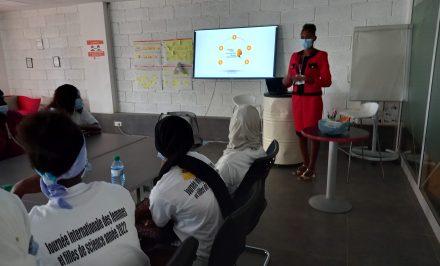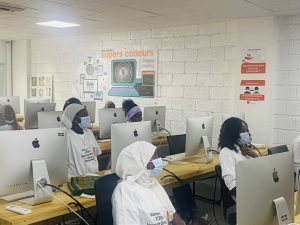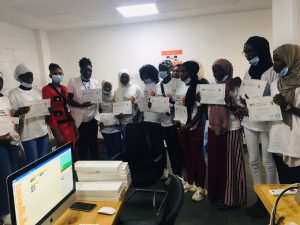 Cameroon : Dr. Yasmine Ndassa, the research scientist turned data storyteller
Cameroon : Dr. Yasmine Ndassa, the research scientist turned data storyteller
 Julien Ngum Che : advocating for the rights of displaced women and youth in Cameroon
Julien Ngum Che : advocating for the rights of displaced women and youth in Cameroon
 Chilufya Mutale Mwila, the Zambian entrepreneur driving financial inclusion across Africa
Chilufya Mutale Mwila, the Zambian entrepreneur driving financial inclusion across Africa
 Wangari Muchiri, the Kenyan engineer committed to accelerating the ecological transition in Africa
Wangari Muchiri, the Kenyan engineer committed to accelerating the ecological transition in Africa


Since 2020, “Women STEM Inspiring Girls for Africa’s Development” (WSIGAD) has organized webinars, training workshops, talk shows, etc. to encourage high school girls in Senegal to choose scientific fields. The initiative, led by students and graduates of the African Institute of Mathematical Sciences (AIMS), plans to extend across Africa.
WSIGAD was founded in 2020 on the initiative of Balbine Olive Mboua Etoga, a Cameroonian computer scientist and former AIMS Master 2 student in Big Data who currently lives in Senegal. Made up of students and former AIMS graduates from various African countries, the NGO is sponsored by Ndèye Niang, a teacher-researcher in statistics at the CNAM (Paris) and a lecturer at AIMS.
The goal of the organization is to encourage African female students to pursue careers in Science, Technology, Engineering, and Mathematics (STEM).
On the advice of Ndèye Niang, Balbine’s teacher, as well as her mentor in the Association of Women Mathematicians of Senegal, the young Cameroonian, a student at AIMS at the time, decided to create the NGO. It was in 2016, during her participation in the 2nd edition of the “Girls and Science: a bright equation” day in Senegal, that Ndèye Niang noticed the interest of young high school girls in this event. The initiative was launched by the Senegalese Association of Women Computer Engineers (SenChix) and the African Association of Women Mathematicians of Senegal (AWMA), in order to encourage girls in secondary school and female undergraduates to choose scientific subjects, especially maths and computer science, and to motivate female undergraduates to stay on the scientific path. During this meeting, the students exchanged with model women scientists and discovered the opportunities offered by mathematics, computer science, and technology studies.
Remembering this interest, she shared it with her mentee. “We noticed that the little girls were very interested in this day. So I told Balbine that I thought it would be good if she could do it more regularly,”Ndèye Niang told Africa Women Experts.
The idea was immediately well received by the young Cameroonian, who confides that she had already been thinking about it for several years. “I already had this drive in me. I only had ideas; I had no support and no one who could tell me that this is a good idea. When the teacher told me about it, I didn’t hesitate. I said to myself that I have to do something,”she tells Africa Women Experts.
A former employee of the Cameroon Youth School Tech Incubator (CAYSTI), a start-up created by Arielle Kitio that introduces children aged 7 to 14 to programming, Balbine succeeded in bringing together her AIMS friends. They elected a board, found a name, created a logo, a page on social networks, and the NGO was officially created in September 2020.
Discovering the application of STEM in everyday life


Based in Senegal, the NGO organizes awareness-raising activities among secondary high school girls in the country. In March 2021, the association organized a webinar on “The impact of STEM in Africa’s development : issues and challenges”. In August 2021, it organized a 2nd webinar on « Artificial Intelligence and Robotics » during which young African women scientists in the given fields shared their experience to inspire African girls.
But the NGO’s main activity remains the organization of training workshops, a program that is particularly appreciated by secondary school girls who discover STEM in a practical way. Balbine remembers with great satisfaction the last training workshop organized last February, on the occasion of the International Day of Women and Girls in Science celebrated on 11 February, in partnership with Orange Digital Center Senegal. An activity where the girls discovered the computer tool and were introduced to coding. “During this day, we trained about twenty girls. Some were discovering computers for the first time. They were so amazed that, when we returned, they were given to Orange to go home, but they were not ready to return. This shows their satisfaction and interest,”she says.
In the future, the NGO intends to diversify its activities, by organizing, mini competitions, Olympiads, etc. to reward the winners and thus encourage them to take an interest in STEM. She also plans to organize visits to companies with high school girls so that they can see how STEM is applied in everyday life. And why not, also show in a fun way how mathematics can be useful. “In Africa, we have several games like Awalé, which are actually mathematics. We could put these games in the hands of young people and ask them to imagine an algorithm,”explains Ndèye Niang.
The NGO also aims to relocate its activities to other countries, such as Cameroon, Nigeria, Côte d’Ivoire where it is already present. And later, expand to all African countries, to impact more girls.
Encouraging girls not to censor themselves
Convinced of the added value of the association in the lives of African schoolgirls, the members of the association believe that today it is really important to encourage girls not to censor themselves. “Sometimes they can censor themselves just because they don’t have any role models or because there are stereotypes, such as that scientific studies are complicated, that they won’t have a husband, that men will be afraid of them…”, explains Ndèye Niang. Moreover, for the teacher-researcher, this awareness-raising should start much earlier, especially in primary school, for the impact to be greater.
Similarly, she stresses that parents and families must be made aware about this issue to see more girls going into science. “We can do everything we want at school, but if nothing is done at home, it will be useless. We need to raise awareness among parents, not just mothers, but especially fathers. Both parents have to agree,”she says. Not to mention a reform of certain textbooks that still convey stereotypes between girls and boys in Africa.
Overcoming the challenge of lack of materials
Beyond the NGO’s ambitions, Balbine and her fellow friends have to deal with the reality on the ground to get girls interested in STEM. One of the main challenges is the lack of materials. “We were asked by a school in Senegal to organise an orientation day there. The school told us that they don’t have a computer room. So everything would have to be done at our own expense: we would have to look for machines,”she explains. Hence, the need for sponsors to support the association’s activities.
Another constraint is related to the gender approach in WSIGAD’s activities, which may not necessarily meet with the approval of some school officials. “In some schools, we may be confronted with the fact that the leaders will not want to train only girls while boys will be in class,”she says.
Despite these obstacles, WSIGAD remains more than determined to bring out more girl scientists in Africa. In line with current events, the NGO will organize its next activity on 12 May, International Women in Mathematics Day. An occasion to find and inspire more future African women scientists.
Danielle Engolo